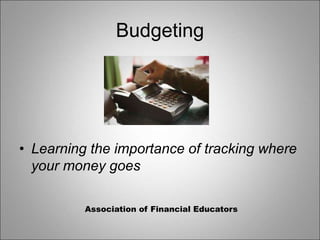Budgeting
- 1. Budgeting âĒ Learning the importance of tracking where your money goes Association of Financial Educators
- 2. Objectives âĒ Learn the facts about money. âĒ Tracking where your money is spent. âĒ Understanding your expenses. âĒ Distinguish wants from needs. âĒ Making a budget work for you.
- 3. The Facts about Money âĒ Understand that every person and/ or household has a limited amount of money, despite income. âĒ Learn to prioritize: What to buy now, what to buy later and what to do without.
- 4. Why take a look at your budget? Your money is your future! âĒ Managing your money is possible and easier than you may think. âĒ Reaching your goals can be a reality. âĒ Avoiding unnecessary debt is possible.
- 5. Where to BeginâĶ âĒ Take a close look at your financial obligations and current spending. -Determine your overhead cost on fixed expenses
- 6. Fixed Expenses âĒ Housing âĒ Utilities -Electric -Gas -Phone -Cable -Water -HOA âĒ Outstanding debt payments âĒ Day care/ tuition âĒ Insurance- Auto/ Mortgage âĒ Transportation expenses
- 7. Variable Expenses âĒ Clothes âĒ Food âĒ Entertainment âĒ Gifts & Celebrations
- 8. The Choices we Face: Is it Necessary? âĒ iPodÂŪ âĒ Going out to eat âĒ Concert tickets âĒ New boots âĒ New clothes âĒ Cable TV âĒ Internet âĒ Manicure âĒ New car âĒ Vacation
- 9. Wants Versus Needs âĒ Understanding the difference between a necessity and a desire can help you manage your spending. âĒ Controlling your budget means making decisions. There will never be enough money for all your needs and wants.
- 10. Small Spending Can Add Up! 1 StarbucksÂŪ drink@ $3.50 $3.50 x 7 days = $24.50 $3.50 x 365 days = $1,227.50 1 SonicÂŪ burger @ $4.25 $4.25 x 7 days = $29.75 $4.25 x 365 days = $1,551.25 1 carton of cigarettes @ $80.00 $32.00 x 12 months = $960 $32.00 x 52 weeks = $4,160.00
- 11. Alternative Options to Scale Back Expenses âĒ Public transportation âĒ Carpool group âĒ Downgrading utility bills -Cable package, phone âĒ Attend free events âĒ Grind your own coffee beans âĒ Cook meals at home âĒ Shop at discount stores âĒ Use coupons
- 12. The Secret to Financial SuccessâĶ. âĒ Learning to live within your income and budget!
- 13. Key Steps to Establishing and Managing Your Budget âĒ Identify all sources of income and calculate the monthly take home âĒ Track all spending for a month. âĒ Decide what is a want and what is a need and re-evaluate. âĒ Create a spending plan that is realistic. âĒ Live within your income.
- 14. Thank you!! âĒ Thank you for attending our Workshop! Please hand in your assessment form and feel free to sign up for a complimentary consultation!














